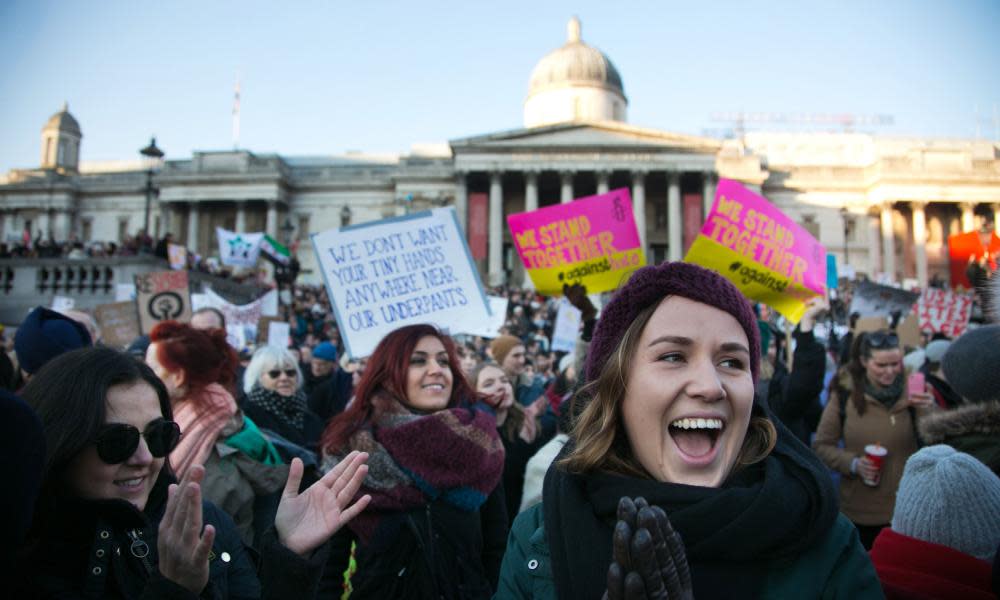You won’t feel alone if you go to a protest on your own | Carmen Fishwick

If we’ve gained anything positive from Donald Trump it’s that he’s reaffirmed so many of our beliefs: that we should live in a tolerant and compassionate world, free from racism and misogyny – and how ridiculous it seems to even have to state that. About 5 million people worldwide protested in solidarity with the Women’s March on Washington last month, and many went on to rally against the US travel ban. This evening – in coordination with One Day Without Us, protesting today for migrant rights – there is a march on parliament against Donald Trump’s divisive rhetoric and actions, and the complicity of Theresa May and the British government in supporting him.
Sadly there now seem to be more opportunities than ever to rally behind issues that connect us. But protest doesn’t come naturally to everyone. Marching along streets where other people are shopping, in a crowd of people you don’t know, chanting loudly against those in power, holding a witty placard, feels, for many of us, like someone else’s story. Standing in front of parliament on a winter evening, demanding that those in power change their course, isn’t on everyone’s wishlist.
Not all of us are brought up with protest as part of our lives. Even the country’s biggest protests have been attended by only a tiny minority. The biggest estimates put the anti-Iraq war march in 2003 – the largest protest in recent history –at 2 million people; the UK’s adult population is about 50 million.
Our social circles, however sympathetic to the cause, might just not do protests. We all want to feel part of a community or group, and shy away from standing out. Our jobs, which define so many of us, can make us fear being photographed and finding our pictures published on websites or on social media. And our increasingly monitored and documented lives make us hesitate in case our names are listed somewhere as people who once pushed back against the political elite.
Apart from petitioning against foxhunting as a teenager, my first protest was the anti-Iraq war march, and since then I’ve been to quite a few. But earlier this year, mostly due to my own disorganisation, I attended my first ever protest alone. I almost didn’t go: was it weird to turn up to a protest without friends? What would I do? Where would I stand? And what about the chanting – you have to have a certain type of character to do this alone. But I had to attend. And I am so glad I did.
I didn’t make any new friends at the London Women’s March, or even speak to anyone. I stood at the edges, taking photos and reading the banners – “This pussy has claws” was one of my favourites. As I marched from Shaftesbury Avenue to Trafalgar Square, the atmosphere was calm. The sense of unity and camaraderie was empowering; a disparate crowd held together by the belief that misogyny should not be normalised, women’s rights must be protected, and that President Trump is a mistake of cataclysmic proportions. It felt comforting to be surrounded by like-minded people, and it felt cathartic to stand up and fight back against the negativity I was, and am, feeling. To read later that day that 5 million people marched around the world, knowing I was one of them, was wonderful.
Not having friends to talk to on the march gave me the space to digest what was happening in a deeper way. I was alone with my thoughts, which encouraged reflection, rather than reaction or commenting to friends. I didn’t join in the chanting – I’m not that unselfconscious yet – but I wouldn’t think twice about going to another protest alone. In fact, I actually look forward to it.
Of course, not everyone can attend marches; signing online petitions and sharing news – and calling out the conspiracy theories – are necessary too. But if you can, and you feel frustrated by the shape our democracies are taking, you should not feel nervous about joining in, even if you have no one to go with.
The larger the protest is reported to be in the media, the stronger the resistance will feel, and the more likely it is to create change. Even if protest doesn’t affect immediate change – the Iraq war still went ahead – it forces alternative ideas and voices into the discussion. We are not compliant, powerless beings who have to accept the world as we find it. If all of us who are unhappy make our voices heard, our governments, who exist to serve us, will have to listen.
The right to protest is one that should be exercised and protected. Now is not the time to hold back.

 Yahoo News
Yahoo News 
